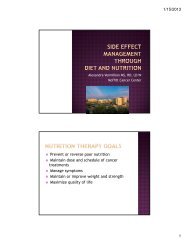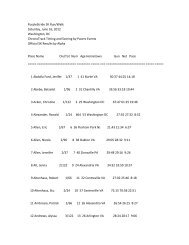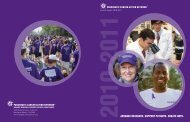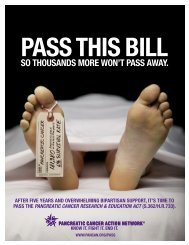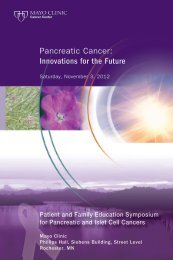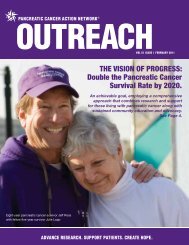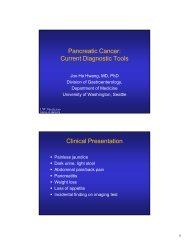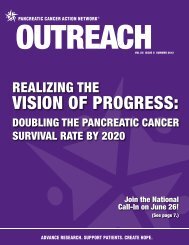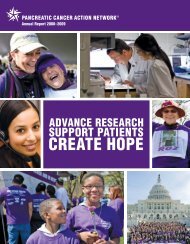Outreach July 2006 - Pancreatic Cancer Action Network
Outreach July 2006 - Pancreatic Cancer Action Network
Outreach July 2006 - Pancreatic Cancer Action Network
Create successful ePaper yourself
Turn your PDF publications into a flip-book with our unique Google optimized e-Paper software.
RESEARCH SCIENTIFIC AND SCIENTIFIC GOVERNMENT AFFAIRS<br />
AFFAIRS<br />
David Z. Chang, MD, PhD<br />
<strong>2006</strong> PanCAN-ASCO Career Development Award<br />
A native of Jiangsu,<br />
China, Dr. David<br />
C h a n g a t t e n d e d<br />
Dartmouth Medical<br />
S c h o o l a n d i s<br />
currently Assistant<br />
P r o f e s s o r o f<br />
Medicine at the<br />
University of Texas/<br />
M D A n d e r s o n<br />
<strong>Cancer</strong> Center.<br />
“Treating pancreatic cancer is one of the<br />
most difficult challenges in medical oncology<br />
because the disease is very resistant to<br />
traditional chemotherapy and radiation<br />
therapy,” says Dr. Chang. “During my<br />
fellowship training at Sloan-Kettering <strong>Cancer</strong><br />
Center, I saw many patients with pancreatic<br />
cancer. I hope to be able to contribute to the<br />
advancement of this field and to the care of<br />
such patients by developing novel treatment<br />
approaches.”<br />
Enabled by PanCAN’s ASCO Career<br />
Development Grant, Dr. Chang plans to<br />
test the effectiveness of cromolyn, an antiasthma<br />
agent that has been used safely for<br />
over 30 years, as a treatment for pancreatic<br />
cancer. “While at M. D. Anderson <strong>Cancer</strong><br />
Center, I have had the opportunity to work<br />
with Dr. Craig Logsdon, a world-renowned<br />
scientist in pancreatic cancer research. His<br />
laboratory has identified a novel mechanism<br />
of action of cromolyn, namely, the inhibition<br />
of the S100P interaction with RAGE and<br />
the resultant inhibition of cancer growth.<br />
In animal studies, cromolyn significantly<br />
inhibited pancreatic cancer growth and was<br />
synergistic with gemcitabine, a standard<br />
cytotoxic agent for pancreatic cancer.<br />
Therefore, I expect to show that cromolyn<br />
is a good treatment for pancreatic cancer<br />
in humans.”<br />
According to Dr. Chang, the continued<br />
cuts of federal funding for research make<br />
the support from foundations/organizations<br />
such as PanCAN a critical component in<br />
keeping the pipeline of young researchers<br />
open. “I first learned about PanCAN during<br />
my fellowship training and have been<br />
impressed ever since by its generous<br />
support for pancreatic research, which in<br />
itself has been very important in fostering<br />
the career development of junior faculty<br />
members. Sadly, I have seen many<br />
promising physician scientists leave the<br />
research field because of the suboptimal<br />
funding environment. The award I receive<br />
from PanCAN will help me carry out the<br />
initial clinical trial of cromolyn, which has the<br />
potential to be a treatment for pancreatic<br />
cancer. I am honored to be part of PanCAN<br />
and proud to serve the larger pancreatic<br />
cancer community.”<br />
Dr. Chang is also a devoted husband and<br />
father of an eight-month-old daughter. He<br />
enjoys camping, fishing, skiing, and hiking and<br />
has won several martial arts championships<br />
over the past 30 years.<br />
Jennifer F. Tseng, MD<br />
<strong>2006</strong> PanCAN-ASCO Samuel Stroum Young Investigator Award<br />
D r . J e n n i f e r<br />
Tseng, who hails<br />
f r o m N e w t o n ,<br />
Massachusetts, is<br />
t h e f i r s t f e m a l e<br />
r e s e a r c h e r t o<br />
receive the Samuel<br />
S t r o u m Y o u n g<br />
Investigator Award.<br />
Dr. Tseng received her medical degree from<br />
the University of California, San Francisco<br />
and was a resident at Massachusetts<br />
General Hospital. She conducted a research<br />
fellowship on pancreatic tumor vaccines<br />
at Children’s Hospital/Boston/Harvard<br />
Medical School, and received a Surgical<br />
Oncology Fellowship at the University<br />
of Texas MD Anderson <strong>Cancer</strong> Center.<br />
Currently, she is an Assistant Professor of<br />
Surgery specializing in pancreatic surgery<br />
at the University of Massachusetts Medical<br />
School and Memorial Medical Center.<br />
Dr. Tseng says she first became fascinated<br />
with cancer research during a UCSF<br />
preclinical seminar, “The Molecular Biology<br />
of <strong>Cancer</strong>.” Her grandfather (a general and<br />
thoracic surgeon) had struggled with and<br />
ultimately passed away from cancer during<br />
her medical school years. “My grandfather’s<br />
illness showed me what it’s like to have to<br />
watch as a loved one struggles with cancer,<br />
and I made a vow then to somehow make<br />
a difference in the effort to find a cure.<br />
<strong>Pancreatic</strong> cancer became my main focus<br />
when, as a medical student, I took care of<br />
a patient who was scheduled for a Whipple<br />
procedure. Unfortunately, we discovered<br />
during laparoscopic surgery that he had<br />
peritoneal mets and had to stop the surgery.<br />
Seeing his disappointment, devastation, in<br />
the recovery room was a turning point in my<br />
career.”<br />
The goal of the project for which Dr. Tseng<br />
has received the PanCAN grant is to generate<br />
a risk score for pancreatic lesions, so that<br />
patients at greatest risk of pancreatic cancer<br />
can be identified early and undergo aggressive<br />
treatment for cure, while patients with benign<br />
lesions can be spared the risks of surgery and<br />
other interventions.<br />
Dr. Tseng has also been honored by the<br />
<strong>Pancreatic</strong> <strong>Cancer</strong> Alliance, a grassroots<br />
organization in Worcester, Mass, as their<br />
<strong>Pancreatic</strong> <strong>Cancer</strong> Alliance Scholar, an honor<br />
that she says “means a great deal to me,<br />
because it comes from people who have dealt<br />
with pancreatic cancer first-hand. I believe that<br />
pancreatic cancer strikes the best, and the<br />
brightest. For that reason, I am determined to<br />
be part of the community that makes our way<br />
toward a cure for this disease.”<br />
Dr. Tseng is married to Marc Sabatine, M.D.,<br />
a cardiologist at Brigham and Women’s in<br />
Boston. They have a six-month old son,<br />
Matteo.<br />
<strong>July</strong> <strong>2006</strong> OUTREACH 5



